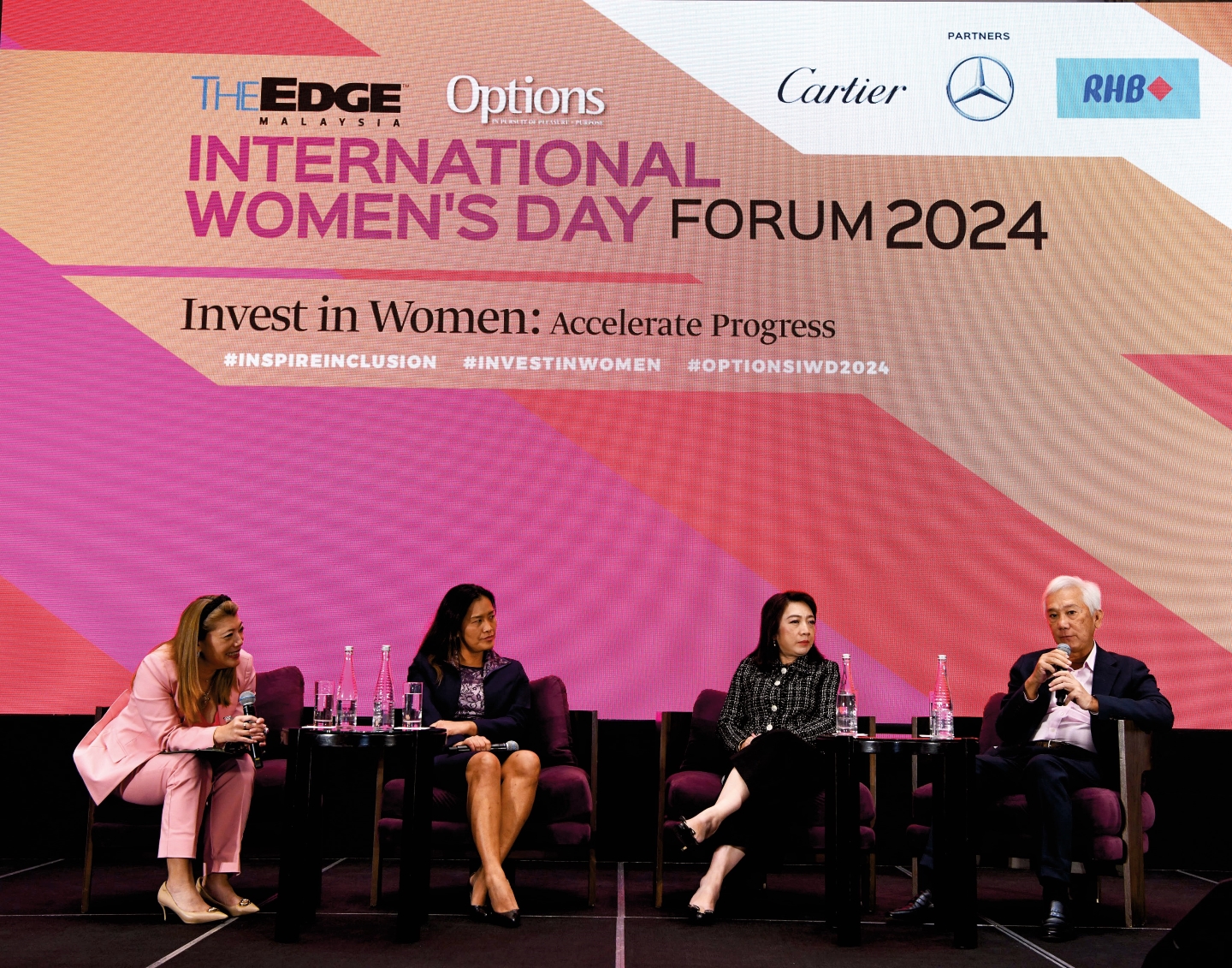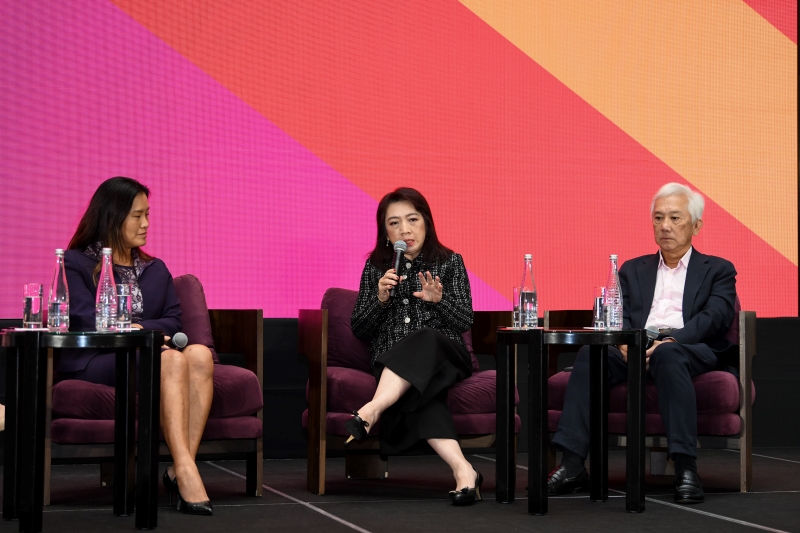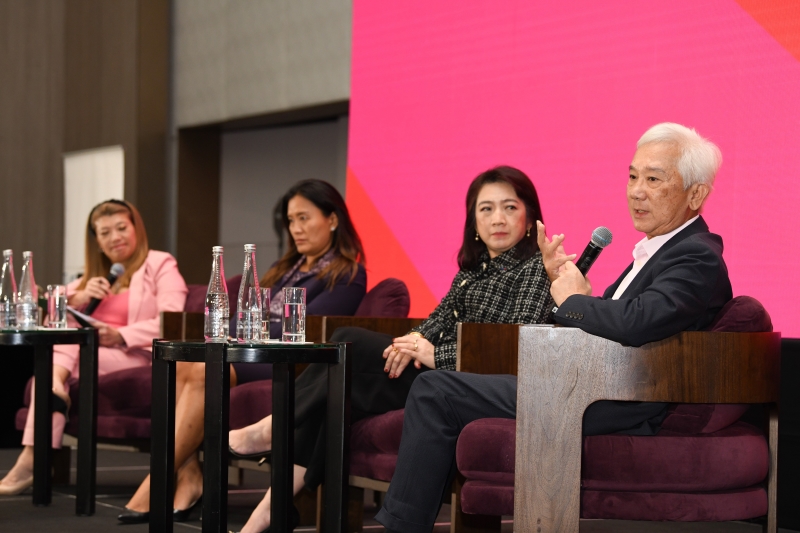
From left: Moderator Freda Liu, Zhang, Ting and Ho (All photos: Low Yen Yeing/ The Edge Malaysia)
The Edge Media Group publisher and group CEO Datuk Ho Kay Tat, Mercedes-Benz Malaysia president and CEO and head of region Southeast Asia II Amanda Zhang, and RHB Banking Group managing director Wendy Ting discuss the key role managers play in creating equal opportunities in the workplace.
Options: Datuk, you mentioned in your opening speech how The Edge’s senior management is dominated by women. Was it by design or default? Tell us about it.
Datuk Ho Kay Tat: I would like to claim credit that it was by design, but I must confess it’s by default. Very interestingly, when I started in the newsroom 40 years ago, every head of department was male. The Edge may be a bit out of the norm because we have 80% women in senior management, which is a very high ratio. But today, I believe even in other newsrooms, there are also a lot of women.
It’s not by design because we don’t have any policies whereby we must have quotas for this or that. It just so happened that over the years, it’s the women who have naturally, organically and, of course, based on performance, emerged to where they are today. It was pure merit.
Wendy, given your immense portfolio, what do you see are the key differences between your female teams in the different countries you oversee?
Wendy Ting: If we’re to compare the least developed countries, I would have to say the female representation, unfortunately, is still a little bit low, partly because of education. But there is no less of a desire to be ambitious and wanting to have career progression.
In RHB itself, we nurture and encourage, because for banks, people are their biggest asset. In Malaysia and Singapore, I would say it depends on the composition of the ladies. In fact, the senior management level is very much dominated by females. My male colleagues would not agree with that, but we all see it and know that it is so. However, we do console our male colleagues that in financial institutions, the C-suite is still very much run by men.
20240311_peo_the_edge_international_womens_day_forum_2024_dsc_9327_lyy.jpg

Amanda, Romania to Malaysia is quite the shift. How do you personally manage all the changes, on the professional as well as personal front?
Amanda Zhang: I was in Romania for 2½ years as CEO of Mercedes-Benz Romania. Before that, I spent 18 years in Germany. Romania and Malaysia are both beautiful countries with very nice people. They’re multilingual and share so many similarities that make arriving quite easy.
On the professional front, I have to say that 21 years ago, when I joined Mercedes-Benz, I was one of the very few women and foreigners in the company. But let’s look at the progress we’ve made. I always say the longer I stay, the less German I speak. That shows how international the company has become. We have very clear objectives and that makes my role from country to country quite easy because we follow the same direction.
Let’s talk about nurturing talent. Wendy, as a leader, how do you consciously nurture female talent in the banking industry?
I think it’s very important for large organisations to always have very clear career progressions. In RHB, we practise that very earnestly. We have talent review sessions and, very importantly, mentorship programmes. We see a fair bit of female talent. But even in this day and age, there’s still that glass ceiling. Sometimes, when I speak to these women, they feel there’s probably not so much [progression] for them. They think surely their male colleagues will be chosen. So, even though it is very important for us to have mentorship programmes, we need to let them know that the barriers are self-imposed.
Clear communication, mentorship, exposure to various industries and inclusivity are important so they know they’re part of the group. This is the only way for us to retain and motivate them.
Amanda, how do you nurture female talent in your own teams in such a male-dominated industry? Or is that also fast changing and a misconception as well?
If you look at the world of Mercedes-Benz, our region in Southeast Asia was actually quite a pioneer when it comes to female leadership. In fact, our company has a 54% female share and there is over 50% female share in the leadership team.
To add to Wendy’s point, I feel we ladies are very self-critical and that leads to the self-imposed barriers. This is a very important starting point — that we don’t doubt ourselves and don’t have to justify when we’re appointed to a leadership role. Second, the world has changed so much.
My team here knows that I always say if you don’t have the appetite for transformation, don’t join the automotive industry. Our job here is far beyond selling cars. It’s about experience, driving transformation, electrification and digitalisation. And we ladies bring a lot of great attributes to that. We’re good communicators, adaptable and team players. We take people with us along the journey. And third, you need a clear system and process behind it.
Back in 2005 or 2006, we had already introduced this voluntary quota of female share and aimed to achieve 20% in our leadership team by 2020. And today, in 2024, we’ve exceeded the target.
20240311_peo_the_edge_international_womens_day_forum_2024_dsc_9296_lyy.jpg

Datuk, do you feel women make natural journalists and writers? How do you build their career road map?
I’m very old school. I believe in throwing them in at the deep end. So, if you are a journalist starting out at The Edge, you will have fantastic opportunities to do the kind of journalism and reporting that may only be offered later if you were to join other media companies.
We realise that — and this applies to both men and women — a lot of young people move on after three years. The turnover is high but it’s good for those who are joining because how often does a 26-, 27-year-old journalist have the chance to interview the CEO of a company or a film star, like the Options team?
So actually, we don’t have any organised training or mentorship. We throw them in at the deep end, but make sure they have support behind the scenes.
How have the three of you addressed this issue of convincing a woman that she can take the next step up?
Ho: I will not mention names, but a couple of years ago, we offered a very senior position in the company to a lady and she said no. She didn’t think she wanted the job, didn’t think she could do it. So I told her, okay if you don’t accept this job, I’m going to bring in somebody from outside. She very quickly agreed. Because when you bring in an outsider, sometimes it creates problems. They might not be totally accustomed to the company culture. Our own experience is that they tend to be more disruptive.
In this case, I ‘blackmailed’ her. You don’t want a repeat of that incident, right? She accepted. She can do the job! Except that she wasn’t confident. So, that’s one way.
Ting: This is a very strong strategy, because typically, they will also think of the team. If you have somebody coming in, how would you be responsible for your team? It’s actually a very powerful tool. If you don’t take the job, somebody else will. The women among us normally have that sense of responsibility, so they will think twice.
Zhang: I really like what I’ve heard. First of all, when somebody is asked, it means everybody around you believes you can do the job. So, why should you doubt yourself? And if we’re talking about leadership and teamwork, it’s never about that one person. It’s always about how that person can inspire, encourage and empower the entire team to go in the same direction. And then, when someone is asked, the stakeholders must always make sure we offer the necessary support so the person has all the ingredients to be successful in what they’re doing. But ultimately, we respect the individual’s decision. I always encourage them and say, ‘Let’s not be so self-critical’.
20240311_peo_the_edge_international_womens_day_forum_2024_dsc_9466_lyy.jpg

This year’s IWD’s theme is ‘Inspire Inclusion’. What does that mean to you?
Ting: I really want to bring up the less developed countries and the females there to be recognised for their efforts. These countries are still male-dominated, so we need to put the women in the forefront. That’s something I’m working on this year. As an organisation, we have the responsibility to bring about opportunity.
Zhang: This is the one thing I feel we in Malaysia are doing really well. We have a multilingual and diverse team. Inclusion is not just about gender, but also respecting one another’s culture and different opinions. This is something I’m really proud of today.
We have a lot of transformative topics like electrification and a very clear sustainability goal as a brand. This is the most resilient team I have ever seen out of all the countries I’ve visited. I believe with this team, we can take on the challenge and drive a lot of the transformation successfully in this market. And that, for me, is the ‘inspire’ part.
Ho: As I said in my welcome address, women make up 50% of the population and I think that from my own experience, there’s never been any glass ceiling for them, especially in the last 20 years. We have many women holding senior positions at The Edge. So, maybe the person who succeeds me will be a woman.
This article first appeared on Mar 25, 2024 in The Edge Malaysia.


